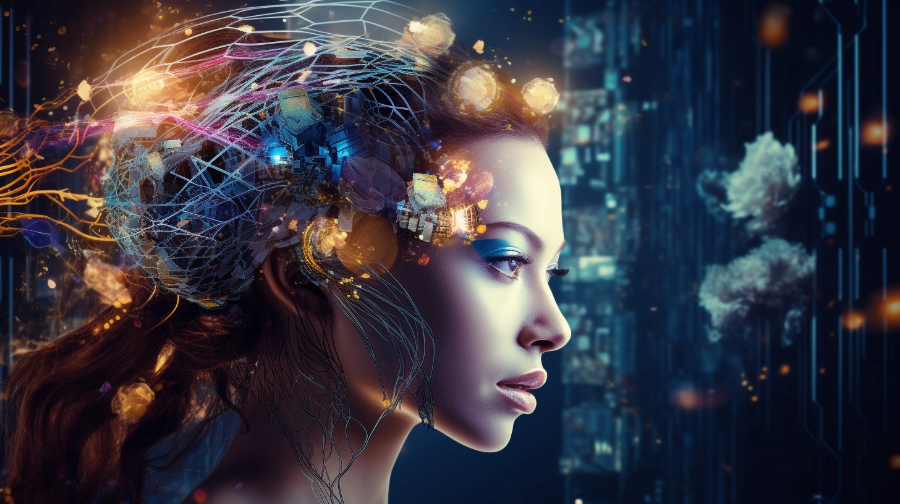The Transformative Potential: Generative AI as a Digital Public Good
Generative AI is a branch of artificial intelligence focused on creating or generating new content autonomously. Unlike other AI systems that analyze data or make decisions based on existing information, generative AI is designed to produce original content such as text, images, music, and more. This technology operates using complex algorithms, often based on neural networks, to understand patterns and structures within large datasets. By learning these patterns, generative AI can generate content that resembles or imitates human-created material.
Applications of AI:
Generative AI has found applications in various fields, including:
- Content Generation: Creating articles, stories, or scripts autonomously.
- Art and Design: Generating artwork, designs, and even assisting in architectural planning.
- Music Composition: Creating new musical compositions or generating melodies.
- Conversational Agents: Developing chatbots and virtual assistants capable of engaging in realistic conversations.
- Data Augmentation: Generating synthetic data for training machine learning models.
The Potential of Generative AI as a Digital Public Good in India
In the landscape of technological innovation, Generative Artificial Intelligence (AI) emerges not just as a groundbreaking tool but as a potential force for societal good. Beyond its capabilities to mimic, synthesize, and create, Generative AI serves a higher purpose as a digital public good, promising transformative impacts across diverse sectors and communities.
Redefining Creativity and Innovation
Generative AI stands at the forefront of revolutionizing creativity and innovation. Its ability to collaborate with human creators has sparked a renaissance in art, design, music, and storytelling. This collaborative potential doesn’t just elevate existing forms of expression; it paves the way for entirely new mediums and methods of creation, enriching cultural experiences and pushing the boundaries of what we deem possible.
Accelerating Scientific Discovery and Healthcare
In the scientific domain, Generative AI acts as a catalyst, propelling breakthroughs in research and healthcare. By streamlining data analysis, aiding in drug discovery, and assisting in predictive modeling, it offers unprecedented opportunities to expedite scientific advancements. It enables researchers to simulate scenarios, predict outcomes, and develop novel solutions, potentially revolutionizing healthcare practices and saving lives.
Bridging the Accessibility Gap
The true strength of Generative AI as a digital public good lies in its accessibility. Efforts to democratize access to these tools empower diverse communities, ensuring that innovation isn’t confined to a select few. Through initiatives that promote inclusivity, this technology becomes a platform for voices often marginalized, fostering a more equitable landscape of innovation and progress.
Ethical Considerations and Responsible Use
While the potential of Generative AI is boundless, navigating ethical considerations remains critical. Addressing biases in datasets, ensuring transparency, and establishing robust ethical frameworks are pivotal. Responsible deployment safeguards against misuse and fosters trust in these powerful technologies, preserving their integrity as tools for societal advancement.
Envisioning a Future of Collaboration and Impact
Looking ahead, the trajectory of Generative AI as a digital public good is promising. Collaborative efforts between stakeholders from various sectors will be instrumental in shaping its ethical use and maximizing its societal benefits. As it continues to evolve, Generative AI holds the promise of steering us toward a future marked by innovation, inclusivity, and positive societal impact.
Future Trends:
Ethical AI Frameworks: Expect the development of robust ethical guidelines and regulations governing AI use. These frameworks will prioritize fairness, transparency, accountability, and privacy protection, ensuring AI technologies align with societal values and serve the common good.
AI for Personalized Learning: AI will revolutionize education further by offering hyper-personalized learning experiences. Adaptive learning platforms powered by AI algorithms will cater to diverse learning styles, abilities, and individual progress, democratizing access to quality education globally.
AI-Powered Governance and Policy-making: Governments will increasingly leverage AI to optimize governance, policy-making, and public service delivery. AI-driven analytics and decision-support systems will aid in evidence-based policy formulation and efficient resource allocation.
Focus on Human-Centric AI: There will be a growing emphasis on human-centric AI design, prioritizing AI systems that enhance human capabilities rather than replace them. This approach aims to create AI technologies that augment human potential and complement human skills.
Conclusion
Generative AI, as a digital public good, embodies the potential to redefine our world. It stands as a testament to human ingenuity, offering a glimpse into a future where technology isn’t just innovative but serves as a catalyst for positive change, breaking barriers, and fostering a more inclusive, creative, and prosperous society.
Source
- https://hbr.org/2023/04/how-generative-ai-could-disrupt-creative-work
- https://www.bitsathy.ac.in/blog/generative-ai-will-disrupt-it-industry/
- https://www.spiceworks.com/tech/artificial-intelligence/articles/industries-ai-will-disrupt/

